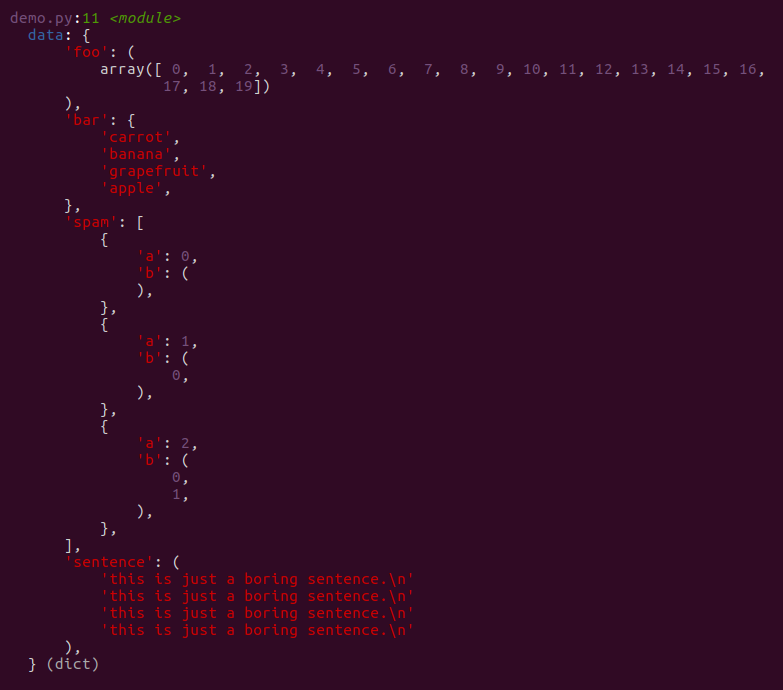Hi,
thanks for devtools I use it quite a lot.
Now I stumbled over the following:
>>> from devtools import debug
>>> class W:
... pass
>>> debug(W)
<stdin>:1 <module> (no code context for debug call, code inspection impossible)
<class '__main__.W'> (type)
>>> class W(:
... pass
>>> from pydantic import BaseModel
>>> debug(BaseModel)
Traceback (most recent call last):
File "<stdin>", line 1, in <module>
File "/Users/weissl/.pyenv/versions/3.8.2/envs/cauldron/lib/python3.8/site-packages/devtools/debug.py", line 122, in __call__
s = d_out.str(highlight)
File "/Users/weissl/.pyenv/versions/3.8.2/envs/cauldron/lib/python3.8/site-packages/devtools/debug.py", line 85, in str
return prefix + '\n ' + '\n '.join(a.str(highlight) for a in self.arguments)
File "/Users/weissl/.pyenv/versions/3.8.2/envs/cauldron/lib/python3.8/site-packages/devtools/debug.py", line 85, in <genexpr>
return prefix + '\n ' + '\n '.join(a.str(highlight) for a in self.arguments)
File "/Users/weissl/.pyenv/versions/3.8.2/envs/cauldron/lib/python3.8/site-packages/devtools/debug.py", line 45, in str
s += pformat(self.value, indent=4, highlight=highlight)
File "/Users/weissl/.pyenv/versions/3.8.2/envs/cauldron/lib/python3.8/site-packages/devtools/prettier.py", line 80, in __call__
self._format(value, indent_current=indent, indent_first=indent_first)
File "/Users/weissl/.pyenv/versions/3.8.2/envs/cauldron/lib/python3.8/site-packages/devtools/prettier.py", line 94, in _format
gen = pretty_func(fmt=fmt, skip_exc=SkipPretty)
File "pydantic/utils.py", line 263, in pydantic.utils.Representation.__pretty__
TypeError: __pretty__() takes exactly 2 positional arguments (0 given)
__pretty__() takes exactly 2 positional arguments (0 given)
>>> class W(BaseModel):
... pass
>>> debug(W)
Traceback (most recent call last):
File "<stdin>", line 1, in <module>
File "/Users/weissl/.pyenv/versions/3.8.2/envs/cauldron/lib/python3.8/site-packages/devtools/debug.py", line 122, in __call__
s = d_out.str(highlight)
File "/Users/weissl/.pyenv/versions/3.8.2/envs/cauldron/lib/python3.8/site-packages/devtools/debug.py", line 85, in str
return prefix + '\n ' + '\n '.join(a.str(highlight) for a in self.arguments)
File "/Users/weissl/.pyenv/versions/3.8.2/envs/cauldron/lib/python3.8/site-packages/devtools/debug.py", line 85, in <genexpr>
return prefix + '\n ' + '\n '.join(a.str(highlight) for a in self.arguments)
File "/Users/weissl/.pyenv/versions/3.8.2/envs/cauldron/lib/python3.8/site-packages/devtools/debug.py", line 45, in str
s += pformat(self.value, indent=4, highlight=highlight)
File "/Users/weissl/.pyenv/versions/3.8.2/envs/cauldron/lib/python3.8/site-packages/devtools/prettier.py", line 80, in __call__
self._format(value, indent_current=indent, indent_first=indent_first)
File "/Users/weissl/.pyenv/versions/3.8.2/envs/cauldron/lib/python3.8/site-packages/devtools/prettier.py", line 94, in _format
gen = pretty_func(fmt=fmt, skip_exc=SkipPretty)
File "pydantic/utils.py", line 263, in pydantic.utils.Representation.__pretty__
TypeError: __pretty__() takes exactly 2 positional arguments (0 given)
__pretty__() takes exactly 2 positional arguments (0 given)
>>>
Could you please give me a hint what I am doing wrong here?




